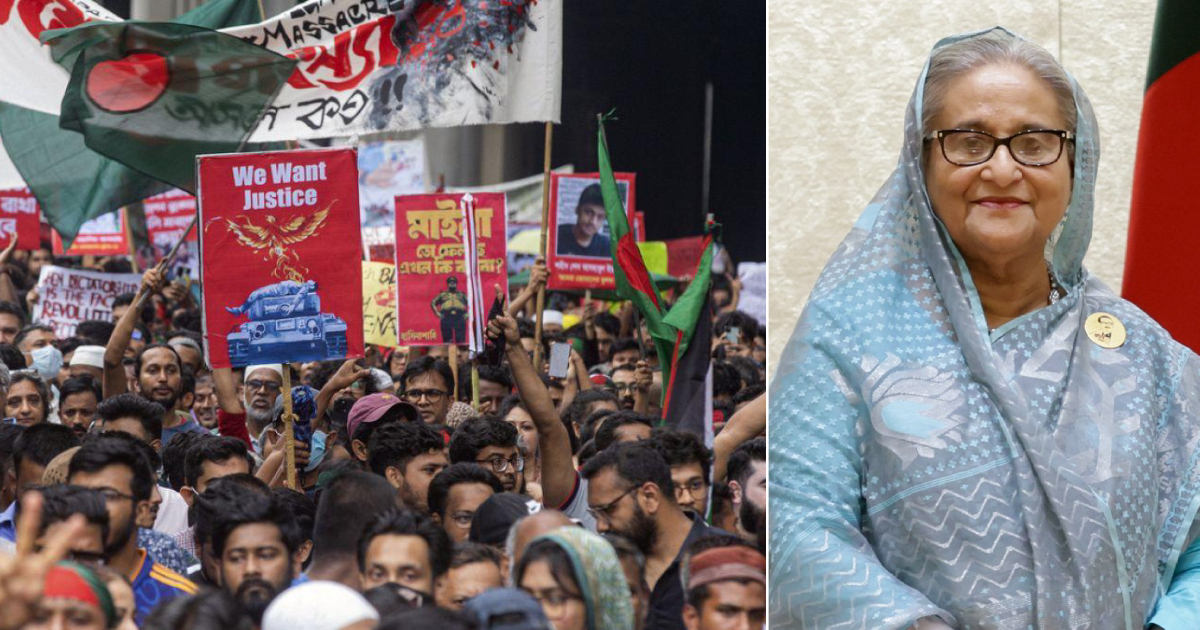Sheikh Hasina, the Prime Minister of Bangladesh, resigned and fled the country on Monday after weeks of massive protests escalated into violence, resulting in the deaths of hundreds of people and thousands of demonstrators storming her residence and other buildings linked to her party and family, according to international media reports.
Hasina, aged 76 and in power since January 2009, stepped down at noon (local time) on Monday and escaped to neighboring India in a military helicopter, reported the BBC. The Prime Minister's resignation came as a consequence of the popular uprising sparked by protests led by young students since last July, opposing a law that established quotas for public administration jobs.
Violent Repression and Escalating Unrest
The protests continued even after the Supreme Court ruled last month that the quota system—which reserved up to 30% of public jobs for relatives of veterans who fought in the country's independence war against Pakistan—had to be drastically reduced, noted the American news agency AP. The police and paramilitary forces violently repressed the demonstrations, resulting in nearly 300 deaths since mid-July, including at least 95 fatalities—14 of whom were police officers—just this Sunday in clashes in the capital, Dhaka, according to AP citing the leading Bengali newspaper Prothom Alo.
Hundreds of people were injured, and around 11,000 have been detained in recent weeks. However, the departure of the leader could usher in further instability in the predominantly Muslim nation of 170 million people, already grappling with high unemployment rates, corruption, and the impacts of climate change.
Hundreds of thousands took to the streets with flags and cheers to celebrate Hasina's resignation, but in some places, the jubilation turned to violence as citizens attacked symbols of her government and party, looted, and burned buildings. "This is not just the end of tyrant Sheikh Hasina; we are putting an end to the mafia state she created," declared Sairaj Salekin, a student protester in Dhaka, to AP.
Crowds stormed Hasina's official residence, setting fires, looting furniture and other items, and taking food from refrigerators. Hundreds gathered in front of the Parliament building, where they hung a banner reading "justice."
In a televised address to the nation, Army Commander General Waker-uz-Zaman announced that he would take over temporarily and seek advice from President Mohammed Shahabuddin to form an "interim government." Later in the evening, after a meeting with the military chief and opposition politicians, President Shahabuddin announced that Parliament would be dissolved and a national government would be formed as soon as possible, leading to new elections.
In statements to the BBC, Sajeeb Wazed Joy, the son of the former Prime Minister and one of her advisors, confirmed that Hasina would permanently retire from politics and defended her legacy. "She is very disappointed that after all her hard work, a minority has risen against her," he said. "When she took power, this country was considered a failed state. It was poor, and today it is seen as one of Asia's rising tigers."
Hasina was re-elected in January for a fourth consecutive term in elections boycotted by her main opponents. Thousands of opposition members were jailed before the elections. The United States and the United Kingdom deemed the results not credible, despite the government's defenses.
Bangladesh's relations with the U.S. and other Western countries have been strained, as these nations have voiced concerns over human rights violations and press freedom in the Asian nation. Hasina's political rivals had previously accused her of becoming increasingly autocratic and endangering the country's democracy.
Key Questions About Sheikh Hasina's Resignation and Bangladesh's Future
The resignation of Sheikh Hasina has raised several important questions about the future of Bangladesh. Below are some key questions and answers regarding the current situation.
Why did Sheikh Hasina resign?
Sheikh Hasina resigned due to massive protests against her government, driven by opposition to a law that established job quotas in the public administration. The protests escalated into violence, resulting in significant unrest and fatalities.
What triggered the protests in Bangladesh?
The protests were triggered by a law that reserved a significant portion of public jobs for relatives of war veterans. Despite a Supreme Court ruling to reduce these quotas, the demonstrations continued, fueled by broader grievances such as unemployment and corruption.
What are the potential consequences of Hasina's resignation?
Hasina's resignation could lead to further instability in Bangladesh. The country is already facing high unemployment, corruption, and climate change issues. The interim government and upcoming elections will be crucial in determining the nation's future.
